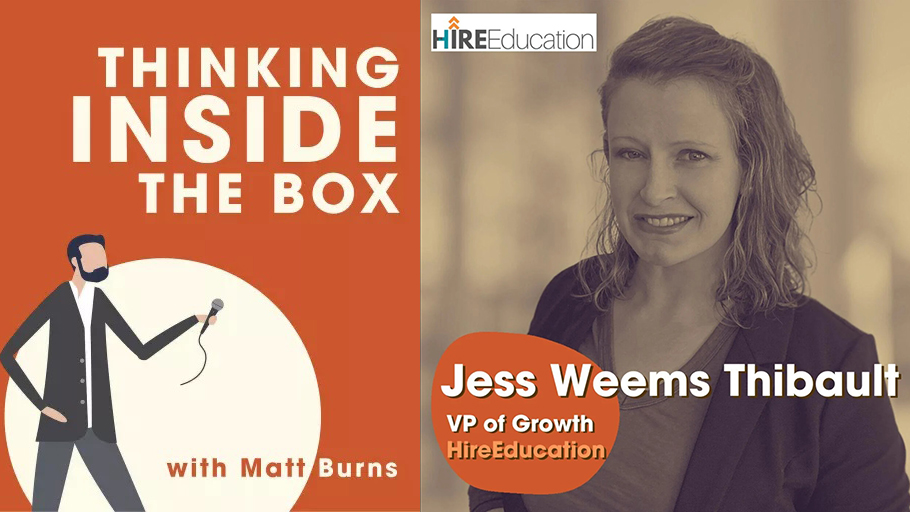Jess Weems Thibault, the VP of Growth atHireEducation, shares how technology is shaping the future of education in an in-depth conversation with Matt Burns on the Thinking Inside the Box podcast. Learn more about how HireEducation’s pioneering approach to finding just the right talent for each position is helping shape the edtech sector. You can listen to the full episode here, and/or read a summary of Jess’s comments below.
Thinking Inside the Box discusses “innovative ways organizations and their leaders overcome complex issues at work.” Edtech is an innovative industry itself, so as talent recruiters specifically in the education technology space, HireEducation can’t operate like a standard headhunter. They need to see how an individual fits with all the other moving pieces to best serve an organization. In this conversation, Matt and Jess delve further into this process and also examine how edtech is changing the education industry.
Jess explains how a mission-driven field like education needs a mission-driven recruiting firm to help with hiring strategy and find the right executive or sales associate to maximize their impact. As a former teacher, Jess herself is a connector who specializes in seeing how pieces fit together. As she explains, “I can put myself in the teacher’s shoes because I used to be a teacher. I understand the financial implications of sales and business development and marketing. I understand the data in between. That sort of broad understanding of an entire industry and an entire overall mission and goal of education is rare.”
Why Education Technology?
She describes the goal of educational technology (edtech) as making education more impactful or further reaching. “It’s a huge lift to educate a human,” Jess says. “There are so many different dynamics in that, and that’s why the edtech landscape is fairly complex. Edtech can be anything from security systems to learning management systems to actual simulations…and big data. [Edtech] really is a microcosm of the rest of the tech landscape in a lot of ways, but specifically applied to how we educate humans from PreK to Gray.” While the biggest chunks of edtech are K12 and higher education, it also encompasses lifelong learning, including corporate, professional, and workforce learning and development.
When Jess started teaching, her classroom only had a TV monitor mounted in the ceiling – no projector. She had to write a grant in order to get the projector. “As a digital native, it just wasn’t working for me. Rather than just draw something on the whiteboard or explain it auditorily, how much more effective is it for me to show a simulation, or better yet, have some sort of interactive content where I can actually hear from everyone in the room so no one gets lost?” Planning and grading are also big time sinks for teachers, something that new AI technology can handle, giving teachers more time to spend on instruction.
Recruiters’ Contributions to the Industry
HireEducation specifically fills talent needs at edtech companies, and the team members pride themselves on finding just the right person from both a skills and a culture perspective. They spend a lot of time with each company at the beginning of a search, questioning and listening. “We usually have a lot of information already about what our client wants for a VP of sales or a marketing executive, but we really want to dig in because there’s so much that’s unsaid,” Jess explains.
As an example of how different companies’ needs can be, she compares the publishing world to the software world. While publishing companies use and develop tech, they’re mainly content-focused. “They change how they deliver that information, but still, the parts of the cell are the parts of the cell, and the kids got to learn the parts of the cell. Whereas software companies are trying to change the way a child is assessed, or the way a teacher can deliver content, or the way that students in colleges are engaged with and have conversations around particular issues, or the mental health crisis, or the way that we train nurses and doctors.” Software as a Service (SaaS) companies seek to solve the problem of looking at all those different pieces and producing the best outcome possible for learners, which is far different than just delivering content. Candidates align with companies based on the nature of their past experiences and their skill set, which historically generates success in both impact and profitability.
In addition to the type of company, Jess says there are many other factors to consider when looking for the perfect talent fit. What does the company sell? How early are they in their life cycle? Early-stage companies have a lot more built-in risk and ambiguity, which isn’t comfortable for all candidates, whereas companies looking to scale need a whole different mentality and set of skills to succeed. At HireEducation, they try to dig into people’s top priorities to learn what motivates them in both work and life in general. Are financial goals at the top of the list? Work-life balance? Making a difference? “But then also there’s so much more. Most candidates want some sort of voice into strategy and want an opportunity for growth. Those are huge, and that informs so much of what makes a good match,” Jess notes.
Sometimes the requests from companies are incredibly specific. “We get requests from clients as nitty gritty as: I need somebody who has a Rolodex of superintendents and a history of selling half-million to $1 million deals at a district level, for five years…in Chicago,” Jess cites by way of example. “And we’re like, okay, yeah, that person exists, we will go find them.”
Changes & Needs in Higher Education
The higher education industry has specific technology needs that other edtech areas don’t, especially surrounding admissions, student engagement, career readiness, and alumni management. Software can address back-end data, teaching and learning, or supporting the students themselves. There’s a big focus right now on how much is invested to attend college versus a student’s return on that investment and their career readiness. There are no clear answers yet, but this question also has major implications for K12 edtech companies. “Because if colleges are going to change how they do admissions, or if they’re going to change what it takes to be successful in college—if they’re going to shift what that looks like to reflect what the career market looks like, then the whole trickle down [for K12] is a big question mark hanging over them right now,” Jess explains. “But there are a lot of tools being generated to try to figure out how we connect more with students. How do we engage? And then how do we help professors teach well, not just lecture. How do we create innovative educational teaching environments at the higher education level? So many professors never learn how to teach. They’re experts in their field, and that’s enough. Some are only there to do research.”
Industry-wide Observations
The HireEducation team constantly watches the edtech industry to stay on top of the latest focus and the struggles companies are facing, and they meet weekly to exchange information. Part of Jess’s job is to attend conferences to listen and gather this information. One of her big takeaways from SXSW EDU last year was “how much COVID had accentuated cracks and gaps that were already there in the first place. COVID didn’t break anything [in education], really, it just showed what was already broken.” She says there’s a silver lining from the pandemic experience because now a lot of those issues are front and center and we can tackle them head-on. For example, the huge gaps in K12 math and literacy that were revealed set the stage for some long-overdue innovation in those areas.
Jess notes that the other big thing that came out of COVID for the edtech industry was a focus on efficacy. “Is what we’re doing effective? Are the outcomes being achieved? Do we even have outcomes in mind? What are we all shooting for and are we even making gains in the right direction?” Attending conferences allows her to learn what people have to say on these topics and hear different perspectives from candidates and thought leaders.
Good Leadership is Critical to Retaining Top Talent
When Matt asked her about how they go about not just attracting the right new talent but helping companies retain them, Jess pointed out that the two go hand in hand. The reason they take the job in the first place is usually also the reason they stay. “In this particular industry, people want to make an impact. People don’t get into edtech just for the money, for example, or other less mission-driven reasons. They want to know that they are making a difference. Now, that said, they also want to know that they have a product that is sellable. You can have a great product that makes a great impact, but it might not actually sell—market fit is still a thing. The finances still have to be there.”
Many candidates also want growth opportunities, including a voice into strategy or “a seat at the table.” They want to know that what they’re building is actually going somewhere. They want stability. It may be about the company culture, or even small things like just wanting to have a corporate credit card. It’s up to managers to ask their team what they need; sometimes it can be really simple.
Most often when people leave a company it’s because they came to work with a specific leader and that leader left, making them less likely to stay. As Jess puts it, “Good leadership is hard to find. It’s always going to be…I don’t often feel like people fully take into account what losing a good leader does [to a company].”
The educational landscape is constantly shifting as we seek to uncover best practices and stronger outcomes for the future. HireEducation is proud to be part of the conversation and the initiatives around matching organizations and human power.
Want to learn more? Listen to the full episode for an exclusive peek into the future of edtech.
Looking to hire? Book a quick chat with Jess to learn more: hireedu.com/jess
More Resources

We get it, interviews can be stressful. They are your main chance to determine if you are a fit for the job. While there are lots of things you should [...]

“The only constant in life is change” -Heraclitus No matter where you are in a company, your career there is unpredictable. Call to mind 10 different decision-makers at your place [...]

Interview prep is not just for candidates! In today’s market, hiring managers must consider how they will attract and secure their ideal candidates as much as candidates need to think [...]
